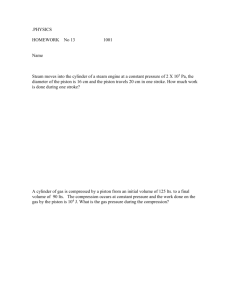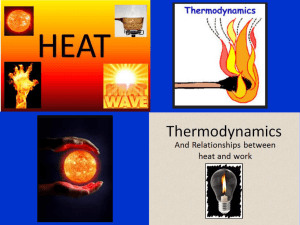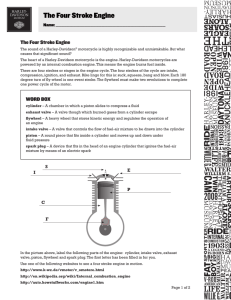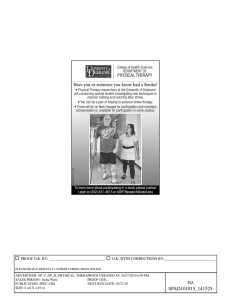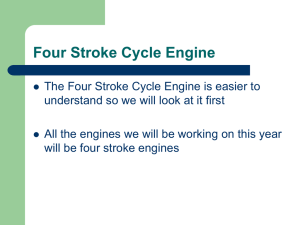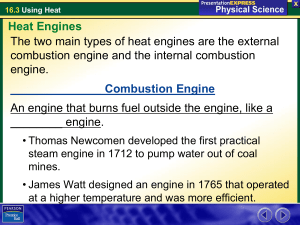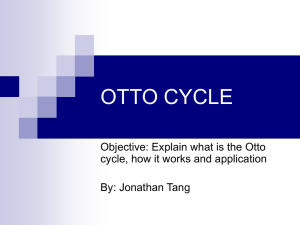Getting Your Strokes
advertisement
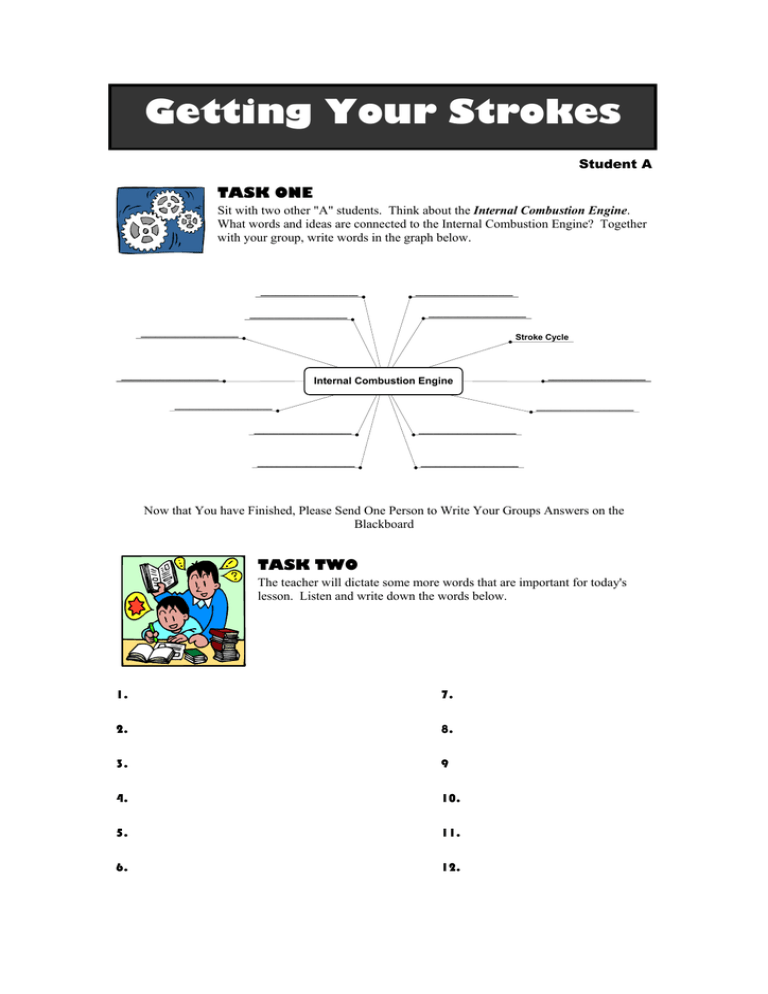
Getting Your Strokes Student A TASK ONE Sit with two other "A" students. Think about the Internal Combustion Engine. What words and ideas are connected to the Internal Combustion Engine? Together with your group, write words in the graph below. ____________________ ____________________ ____________________ ____________________ ____________________ Stroke Cycle ____________________ Internal Combustion Engine ____________________ ____________________ ____________________ ____________________ ____________________ ____________________ ____________________ Now that You have Finished, Please Send One Person to Write Your Groups Answers on the Blackboard TASK TWO The teacher will dictate some more words that are important for today's lesson. Listen and write down the words below. 1. 7. 2. 8. 3. 9 4. 10. 5. 11. 6. 12. TASK THREE Game Time. Make a group of four or five people. The Japanese meaning of the vocabulary words are written on sheets on the blackboards around the room. Send only one student to find one word. The student will run to the blackboard, memorize the word, and run back to the group. He or she will tell the group the word. The group writes down the word, and sends another person to find another word. The team who finishes first is the winner! Vocabulary Word Cycle Piston Exhaust Combustion Cylinder Intake Japanese Meaning Vocabulary Word Compression Ignition Mixture Motion Power Valve Japanese Meaning TASK FOUR Pair Work. Your name is Mr. Scott. You are an expert on the Internal-Combustion Engine. You are going to train Delbert (Student B). Read your part of the dialog to your partner. Listen to your partner. Speak when he or she is finished. Do not look at your partner's paper. Scott: Delbert: Scott: Delbert: Scott: Delbert: Scott: Delbert: Scott: Delbert: Scott: Delbert: Scott: Delbert: Scott: Hi Delbert. Are you ready to get started? Ok. Today I am going to tell you about the internal combustion engine. Well, an internal combustion engine is an engine that produces power by burning fuel inside it. Do you understand? Ok. So, today I will tell you about the four-stroke cycle engine. A stroke is when the piston makes a movement inside the cylinder of the engine. There are four stokes. They are the intake stroke, the compression stroke, the power stroke and the exhaust stroke. Look at this picture. Scott: Delbert: Scott: Delbert: Scott: Delbert: Scott: Delbert: Scott: On the first stroke, the intake valve opens up and the exhaust valve closes. That's right. Air also fills the chamber. On the second stroke, the intake and exhaust valves are closed, and the piston moves upward. That's right. This is called the ignition stroke. The heat from this combustion forces the piston downward. In the final stroke, the exhaust valve opens up, and the piston rotates upward. Now the cylinder is ready for another cycle. No problem, Delbert. TASK FIVE Read the article about the Internal Combustion Engine. Answer the questions. The Operation of the Internal-Combustion Engine The operation of the internal-combustion reciprocating engine employs either a four-stroke cycle or A two-stroke cycle. (A stroke is one continuous movement of the piston within the cylinder. In the four-stroke cycle, also known as the Otto cycle, the downward movement of a piston located within a cylinder creates a partial vacuum. Valves located inside the combustion chamber are controlled by the motion of a camshaft connected to the crankshaft. The four strokes are called, in order of sequence, intake, compression, power, and exhaust. On the first stroke the intake VALVE is opened while the exhaust valve is closed; atmospheric pressure forces a mixture of gas and air to fill the chamber. On the second stroke the intake and exhaust valves are both closed as the piston starts upward. The mixture is compressed from normal atmospheric pressure (1 kg/sq cm, or 14.7 lb/sq in) to between 4.9 and 8.8 kg/sq cm (70 and 125 lb/sq in). During the third stroke the compressed mixture is ignited--either by compression ignition or by spark ignition. The heat produced by the combustion causes the gases to expand within the cylinder, thus forcing the piston downward. The piston's connecting rod transmits the power from the piston to the crankshaft. This assembly changes reciprocating--in other words, up-and-down or back-and-forth motion--to rotary motion. On the fourth stroke the exhaust valve is opened so that the burned gases can escape as the piston moves upward; this prepares the cylinder for another cycle. Questions 1. What are the two types of cycles in an internal-combustion engine? 2. The four-stroke cycle is also known as what? 3. What are the four strokes called? 4. What happens during the first stroke? 5. What happens during the second stroke? 6. What happens during the third stroke? 7. What happens during the fourth stroke? TASK SIX Listen now to the instructor. The instructor will give a short presentation about the internal-combustion engine. As you listen, number the pictures from 1 to 4. Getting Your Strokes Student B TASK ONE Sit with two other "B" students. Think about the Internal Combustion Engine. What words and ideas are connected to the Internal Combustion Engine? Together with your group, write words in the graph below. ____________________ ____________________ ____________________ ____________________ ____________________ Stroke Cycle ____________________ Internal Combustion Engine ____________________ ____________________ ____________________ ____________________ ____________________ ____________________ ____________________ Now that You have Finished, Please Send One Person to Write Your Groups Answers on the Blackboard TASK TWO The teacher will dictate some more words that are important for today's lesson. Listen and write down the words below. 1. 7. 2. 8. 3. 9 4. 10. 5. 11. 6. 12. TASK THREE Game Time. Make a group of four or five people. The Japanese meaning of the vocabulary words are written on sheets on the blackboards around the room. Send only one student to find one word. The student will run to the blackboard, memorize the word, and run back to the group. He or she will tell the group the word. The group writes down the word, and sends another person to find another word. The team who finishes first is the winner! Vocabulary Word Cycle Piston Exhaust Combustion Cylinder Intake Japanese Meaning Vocabulary Word Compression Ignition Mixture Motion Power Valve Japanese Meaning TASK FOUR Pair Work. Your name is Delbert. You are learning about the Internal-Combustion Engine. You are speaking with Mr. Scott (Student A). Read your part of the dialog to your partner. Listen to your partner. Speak when he or she is finished. Do not look at your partner's paper. Scott: Delbert: Scott: Delbert: Scott: Hello Mr. Scott. Yes sir. Delbert: Scott: I'm sorry, but what's an internal combustion engine? Delbert: Scott: I think so. Go on. Delbert: Scott: What's a stroke? Delbert: Scott: Oh. Ok. Delbert: Scott: I see. Scott: Delbert: Scott: Then gasoline enters the chamber, right? Delbert: Then during the third stroke, the gasoline and air are ignited by the spark plug, right? Scott: Delbert: Scott: Then the crankshaft rotates. What happens next? Delbert: Wow! That's easy! Thank you for explaining it to me, Mr. Scott. Scott: TASK FIVE Read the article about the Internal Combustion Engine. Answer the questions. The Operation of the Internal-Combustion Engine The operation of the internal-combustion reciprocating engine employs either a four-stroke cycle or A two-stroke cycle. (A stroke is one continuous movement of the piston within the cylinder. In the four-stroke cycle, also known as the Otto cycle, the downward movement of a piston located within a cylinder creates a partial vacuum. Valves located inside the combustion chamber are controlled by the motion of a camshaft connected to the crankshaft. The four strokes are called, in order of sequence, intake, compression, power, and exhaust. On the first stroke the intake VALVE is opened while the exhaust valve is closed; atmospheric pressure forces a mixture of gas and air to fill the chamber. On the second stroke the intake and exhaust valves are both closed as the piston starts upward. The mixture is compressed from normal atmospheric pressure (1 kg/sq cm, or 14.7 lb/sq in) to between 4.9 and 8.8 kg/sq cm (70 and 125 lb/sq in). During the third stroke the compressed mixture is ignited--either by compression ignition or by spark ignition. The heat produced by the combustion causes the gases to expand within the cylinder, thus forcing the piston downward. The piston's connecting rod transmits the power from the piston to the crankshaft. This assembly changes reciprocating--in other words, up-and-down or back-and-forth motion--to rotary motion. On the fourth stroke the exhaust valve is opened so that the burned gases can escape as the piston moves upward; this prepares the cylinder for another cycle. Questions 8. What are the two types of cycles in an internal-combustion engine? 9. The four-stroke cycle is also known as what? 10. What are the four strokes called? 11. What happens during the first stroke? 12. What happens during the second stroke? 13. What happens during the third stroke? 14. What happens during the fourth stroke? TASK SIX Listen now to the instructor. The instructor will give a short presentation about the internal-combustion engine. As you listen, number the pictures from 1 to 4. Strokes Lecture A four-stroke engine, the type found in most automobiles, uses four strokes in its power cycle. Intake, compression, power and exhaust. During the intake stroke, a descending piston sucks in an air fuel mixture through an intake valve. The valve closes and the piston rises, compressing the air and fuel to an explosive level. The power stroke begins just before the piston reaches the top, when the spark plug ignites this mixture. The resulting explosive force pushes the piston down, which turns the crankshaft. In the last stroke, the exhaust valve opens, the piston rises, pushing out the burned gasses, until at the top of the stroke, the exhaust valve closes. The intake valve then opens, and the four stroke cycle begins again.
